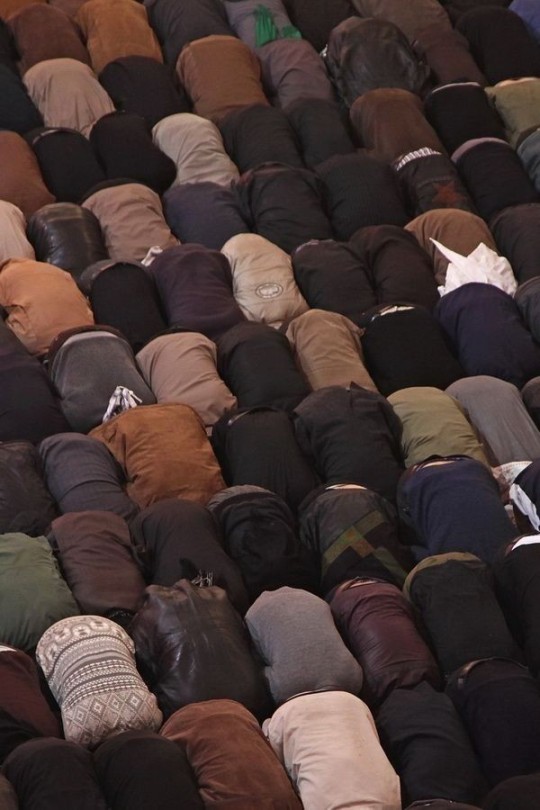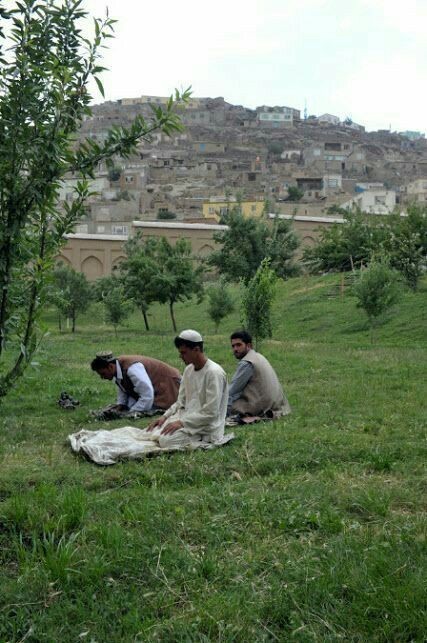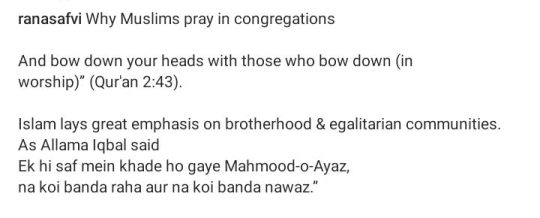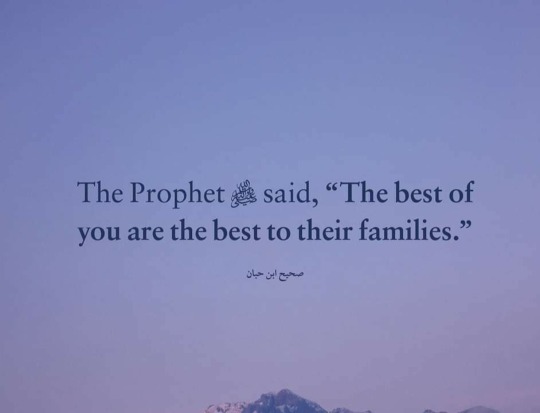#Islamic teachings
Explore tagged Tumblr posts
Text







#urdu literature#urdu poetry#urdu stuff#literature#desiblr#islamicreminders#islamicquotes#islamic teachings#islamic knowledge#beauty of islam#muslim#muslimah
22 notes
·
View notes
Text
He is the One Who has made the earth humble at your service. So move through its tracts and enjoy His provisions. Bear in mind that the revival to New Life will again be in His Dominion.

#islam#holy quran#islamdaily#allah#islamic#quran kareem#quran#intothelight#bekind#quoteoftheday#picoftheday#reminders#islamic teachings#monotheism
20 notes
·
View notes
Text

#muslim#islam#muslimah#islam help#muslimah motivation#islamic saying#islamic quote#deen#islamic#islampost#hadees sharif#hadith#islamic teachings#islamic thoughts#islamic reminders#family#bond#believer#prophet muhammad#ﷺ
197 notes
·
View notes
Text
This world is like a snake, soft to touch, but full of venom inside.🥀
Imam Ali ع
#imam ali#islamicquotes#islamic knowledge#islamic post#islam#islamic teachings#life#writers on tumblr#qoutes#quotes#post on tumblr#writing inspiration#quote
77 notes
·
View notes
Text
Surah Al Qasas: Chapter 2
Pharaoh divided the people of Egypt into two groups.
The two groups were:
-Bani Israel - who shifted to Egypt through Yusuf AS
-Qibti - The locals of Egypt
Although they were living in same land, Pharaoh had created a division.
He would oppress Bani Israel. He made them the lowest class and tortured them to the point that he would slaughter their sons and keep the women alive and no one from the other group stood up to defend them.
Because of the division. Firaun had done a good job of separating them, creating animosity between them.
This was very important for Firaun because if people start seeing themselves as one, then they may unify, and if they unify, then he may lose control over them. If you can keep people apart, if you can keep people divided, then you can pick them off easily. If people are united, you can't touch them. The easiest way to do that is to create a class society.
So, Pharaoh had a plan. He wanted to destroy, oppress, and control Bani Israel.
But Allah had a different plan. Allah wanted to make those oppressed people leaders and inheritors of the land as mentioned in Surah al Qasas.
Whose plan worked out at the end? Allah's plan!
Oppression and injustice cannot exist forever. Allah does not like fasaad. He allows it to happen, He let's the oppressors do whatever they want to only for some time.
Eventually what happens? Allah intervenes and seizes the oppressor.
We have studied again and again that any person who reached the height of power, eventually he was brought down.
Prophet SAW said, Fear the prayer of the oppressed, for indeed it is carried on clouds. Allah says by my honor and glory, I will surely help you even if it is after a time.
THIS IS WHY WE MUST NEVER LOSE HOPE.
There seemed to be no escape for Bani Israel, but weren't they saved? Yes.
Allah was telling this story to the Prophet (pbuh) when the Quraysh were oppressing him and every Muslim in Makkah. It sent a message that your pharaoh, the Quraysh, will be brought down very soon. Through the Prophet (pbuh), this story tells us that today's pharaoh 🇮🇱 will also be brought down very soon, and the oppressed people 🇵🇸 will be free. In the end, it is Allah's plan that wins.
#islamdaily#quran#islam#islamicreminder#islamicquotes#islamic teachings#islampost#islamquotes#free gaza#فلسطین#palestine
139 notes
·
View notes
Text
"Feminism has fought no wars. It has killed no opponents. It has set up no concentration camps, starved no enemies, practiced no cruelties. Its battles have been for education, for the vote, for better working conditions, for safety in the streets, for child care, for social welfare, for rape crisis centres, women's refuges, reforms in the law. If someone says, 'Oh, I'm not a feminist', I ask, 'Why? What's your problem?' "
- Dale Spender, Man Made Language
#feminism#feminist blog#chaotic academia#cats and books#islamic teachings#tumblr#free gaza#feminist quotes#feminist literature#womens rights#equality#gender equality#feminist art#light academia
47 notes
·
View notes
Text

ALHAMDULILLAH
Don't just thank Allah when everything's going right, thank Him even when things are challenging.
📜 This will be (Sadaqah Jariyah) an ongoing charity for you and me, so feel free to Save, Share or Re-post for other's benefit!
#islamic knowledge#islamic#islamicreminders#islamicquotes#islamicart#islamic design#islamicpost#islamdaily#islam#islamic quotes#islamic world#islamic teachings#islamic posts#islamic art#islamic life#islamic content#muslimquotes#muslim#alhamdulillah#thankful#challenging#life quote#islamic quote#quoteoftheday#beautiful quote#quotes#mountains#deen#dawah#islamification
22 notes
·
View notes
Text
SOMEONE'S LAST WORDS.
6 notes
·
View notes
Text

اللَّهُمَّ صَلِّ وَ سَلِّمْ عَلَى نَبِيِّنَا مُحَمَّدٍ
O Allah, we ask for your peace and blessings upon our Prophet Muhammad ♡
#islamic#islam#muslim#islamic teachings#islamic posts#islamic quotes#islamic world#islamic reminders#islamic aesthetic#islamic dua#quran#muslimquotes#islaam#islamicpost#welcome to islam#islam is peace#beauty of islam#artists on tumblr#art#spilled ink#literature#dark academia#light academia#peace
13 notes
·
View notes
Text

Private Admonition vs. Public Criticism: The Islamic Approach to Addressing Sins
This balanced approach exemplifies the mercy and wisdom of Islamic teachings, ensuring both individual reform and societal well-being.
#islamic teachings#islam#welcome to islam#manhaj salaf#salaffiyah#sayings of the salaf#salafushalih#salaf#hadith
3 notes
·
View notes
Text



So remember Me; I will remember you. And be grateful to Me and do not deny Me.
- Quran 2:152
#islam#muslim#muslimah#pakistani muslim#pakistani muslimah#quran ayah#holy quran#muslim academia#muslim dark academia#muslims#islamic reminders#pakistani muslims#muslim light academia#islam aesthetic#deenoverdunya#hijab#hijabi#hijab girl#progressive muslims#progressive islam#islamic#islamislove#islamic quotes#islamic teachings#islamic posts#islamic advice#islamic aesthetic#islamic faith#islamic knowledge#islamic life
2 notes
·
View notes
Text
When the Majority Rules, But Truth Remains Silent: Unveiling the Deception of Consensus

In the journey of faith, reminders serve as both guidance and a safeguard. They keep us grounded, reminding us of the fundamental truths that govern our beliefs, not only in the seen world but in the unseen as well. For the followers of Ahlul Bayt, among the most significant of these truths is the Wilayat of Imam Ali (عليه السلام). It is a principle so integral to our faith that its acceptance is non-negotiable. Yet, despite its monumental importance, many stray from the path, either unknowingly or willfully.
The Foundation of Faith: The Wilayat of Imam Ali (عليه السلام)
Imam Ja'far al-Sadiq (عليه السلام) said:
"إِنَّ إِكْمَالَ الدِّينِ فِي وِلَايَتِنَا وَالتَّبَرُّؤُ مِنْ أَعْدَائِنَا"
"The completion of faith lies in accepting our Wilayat and disassociating from our enemies."
(Source: Al-Kafi, Vol. 2, Hadith 23)
This hadith is not just a passing statement—it is the foundation of every believer’s relationship with Allah. Wilayat isn’t just a doctrine; it is the very essence that completes one’s faith. Without it, the foundation of one’s submission to Allah remains fractured, unable to bear the weight of true piety.
The Wilayat of Imam Ali (عليه السلام) is not merely a title or a symbolic gesture; it is a divine command, and to reject it is to reject the very fabric of Islam itself.
The Spiritual Peril of Rejecting Wilayat
Imam Ali (عليه السلام) himself warned:
"مَن جَحَدَ وِلَايَتِي بَعْدَ أَنْ يَعْرِفَهَا فَكَأَنَّهُ عَابَدٌ لِلْأَصْنَامِ وَمُشْرِكٌ بِاللَّهِ"
"He who rejects my Wilayat after recognizing it is like the one who has worshipped idols and associated partners with Allah."
(Source: Nahjul Balagha, Saying 108)
The weight of these words cannot be overstated. Rejecting the Wilayat of Imam Ali (عليه السلام) is not a mere intellectual disagreement; it is akin to the gravest form of spiritual rebellion. To deny him is to step outside the circle of those who truly adhere to Allah's will. This rejection is not just an act of ignorance but one of willful ignorance—an act that Allah does not take lightly.
Accountability on the Day of Judgment
The consequences of this rejection are not only felt in this world but also in the Hereafter. Imam Ja'far al-Sadiq (عليه السلام) said:
"يُسْأَلُ النَّاسُ فِي يَوْمِ الْقِيَامَةِ عَنْ ثَلاثَةٍ: عَنْ الصَّلاةِ وَالزَّكَاةِ وَالْوِلَايَةِ، فَمَنْ قَبِلَ الْوِلَايَةَ وَفَاتَتْهُ الْأُخْرَيَيْنِ غُفِرَ لَهُ، وَمَنْ جَحَدَ الْوِلَايَةَ فَإِنَّ شَيْئًا لَا يَنْفَعُهُ"
"On the Day of Judgment, people will be asked about three things: prayer, zakat, and Wilayat. If they accept Wilayat but fall short in the other two, their shortcomings will be forgiven. But if they reject Wilayat, nothing else will benefit them."
(Source: Bihar al-Anwar, Vol. 27, Hadith 65)
This narration poignantly underscores the irreplaceable value of Wilayat. The Day of Judgment will be a moment where all deeds will be scrutinized, and it is the acceptance of Wilayat that will determine whether other deeds can bear fruit. To reject the guardianship of Imam Ali (عليه السلام) is to negate the very foundation of one’s faith, rendering all other acts of worship meaningless.
Wilayat: The Pillar of Islam
As Imam Muhammad al-Baqir (عليه السلام) emphasized,
"الإِسْلَامُ بُنِيَ عَلَى خَمْسَةٍ: عَلَى الصَّلَاةِ وَالزَّكَاةِ وَالصَّوْمِ وَالْحَجِّ وَالْوِلَايَةِ، وَلَمْ يُؤَكَّدْ شَيْءٌ مِّثْلَ الَّذِي فِي الْوِلَايَةِ"
"Islam is built on five pillars: prayer, fasting, zakat, Hajj, and Wilayat. None were emphasized as much as Wilayat."
(Source: Al-Kafi, Vol. 2, Hadith 18)
While prayer and fasting are undoubtedly essential, it is Wilayat that holds the foundation together. Without it, the pillars of Islam are like a structure built on shifting sands. Wilayat gives meaning to every act of worship, for it is only through the love and allegiance to the rightful successors of the Prophet (صلى الله عليه وآله) that our deeds can be validated in the eyes of Allah.
The Ark of Salvation: A Call to Hold Firm to the Right Path
The Prophet Muhammad (صلى الله عليه وآله) famously stated:
"مَثَلُ أَهْلِ بَيْتِي فِيكُمْ كَمَثَلِ فُؤَادِ نُوحٍ، مَن رَكِبَهَا نَجَا وَمَن تَخَلَّفَ عَنْهَا هَلَكَ"
"The example of my Ahlul Bayt among you is like the Ark of Noah: whoever embarks upon it is saved, and whoever turns away from it is drowned."
(Source: Bihar al-Anwar, Vol. 2, Page 275)
This profound analogy likens the Wilayat of Ahlul Bayt to the Ark of Noah—a vessel of salvation. Rejecting the guidance of the Ahlul Bayt, and specifically the Wilayat of Imam Ali (عليه السلام), is akin to abandoning the Ark, exposing oneself to spiritual peril and eternal loss.
The Harsh Reality of Denying Wilayat: A Sin Equivalent to Zina
Finally, the words of Imam Ali (عليه السلام) himself strike a chilling reminder of the importance of Wilayat in our prayers.
"مَن جَحَدَ وِلَايَتِي حَتَّى إِنْ صَلَّى صَلَاةَ الْأَنْبِيَاءِ وَصَامَ صِيَامَ الْمَلَائِكَةِ لَمْ يَتَقَبَّلْ اللَّهُ صَلَاتَهُ وَصِيَامَهُ، فَإِنَّهُ كَالَّذِي أَتَى الْكَعْبَةَ فَزَنَى فِي حَجَرِهَا"
"Whoever denies the Wilayat of Ali (عليه السلام), even if they perform prayers like the Prophets and fast like the angels, their prayers and fasting will not be accepted by Allah. Such a person is like the one who has committed zina (adultery) in the presence of the Kaaba."
(Source: Bihar al-Anwar, Vol. 27, Page 65)
This narration holds an undeniable gravity. The act of rejecting Imam Ali's (عليه السلام) Wilayat, even while performing the most essential acts of worship, is equated with one of the gravest sins: zina. In the context of the Kaaba—the most sacred site in Islam—this equivalence serves as a wake-up call. How can we stand before Allah with our hearts divided, denying His chosen leader, Imam Ali (عليه السلام), and still expect our worship to be accepted?
Conclusion: A Reminder to Stay True to the Right Path
This article is not simply a reminder for others but a reminder for myself above all. The Wilayat of Imam Ali (عليه السلام) is not a peripheral belief; it is the essence of our faith. We cannot claim allegiance to Allah while turning away from His chosen representative. As we navigate our lives, let us remain firmly anchored in the guidance of Wilayat. Let these reminders serve as beacons to keep us on the right path, ensuring that our faith is complete and our actions are accepted in the eyes of Allah.
---
Sources and Further Reading:
1. Al-Kafi, Vol. 2 (Hadith 23, 18)
2. Nahjul Balagha (Saying 108)
3. Bihar al-Anwar, Vol. 27 (Hadith 65, Page 275)
For further study, you may explore reliable online sources such as Al-Islam.org or ShiaBooks.org. These platforms provide access to various Shia texts and scholarly resources on the teachings of Ahlul Bayt.
#Ahlul Bayt#Wilayat of Imam Ali#Islamic Teachings#Shia Islam#Spiritual Reflection#Faith and Belief#Islamic Philosophy#Nahjul Balagha#Bihar al-Anwar#Al-Kafi#Importance of Wilayat#Quranic Guidance#Spiritual Growth#Ark of Salvation#imam ali#maula ali#shia#ya ali maddad#artists on tumblr#literature#pandora#pandora's box#pandora's vault
2 notes
·
View notes
Text
"The body's weakness comes from illnesses, while the heart's weakness comes from sins. And just as the body does not taste the delights of food when it is ill, the heart does not taste the delights of worship when it is sinful."
-Dhul-Nun al-Misri رضي الله عنه
#muslim#islam#muslimah#islam help#muslimah motivation#islamic saying#islamic quote#deen#islamic#islampost#sufi wisdom#sufi#sufism#know thyself#prayer#praying#worship#tasawuff#taste#tasawwuf#sin#sins#sinners#repentance#repent#islamic teachings#islamic reminders#islamdaily
10 notes
·
View notes
Text

We will all walk the path of resistance and the path of Sinwar. If they kill Sinwar today, a hundred Sinwars will emerge to take his place.
If Israel thinks that by killing Yahya Sinwar it will stop the Palestinians from defending their land, it is mistaken. Israel has killed hundreds of leaders, including Yasser Arafat (Abu Ammar), Ahmed Yassin, Abdul Aziz al-Rantisi, Abu Ali Mustafa, Ismail Haniyeh, and many other leaders.
But the result has always been the opposite: the resistance grows fiercer, stronger, and more determined.
No one can deny the truth: Palestine belongs to the Palestinians. No matter how much time passes or how great the tyranny becomes, the day will come when this despicable Zionism🇮🇱 will come to an end—this virus that is sweeping the world with its rotten ideas.
#islamic teachings#islamicquotes#welcome to islam#muslim#prophet#allahuakbar#dua#hadith#quraan#prophet muhammad#free palestine#save palestine
6 notes
·
View notes
Text
Story of Ibrahim AS - Chapter 7
Hajrah is left alone in the desert by her husband. She has a newborn baby who needs milk, food, and shelter. There were no fields, no animals to get milk from. And when the husband was leaving, she asked him, "Is this what my Lord commands?" Ibrahim AS replied, "Yes, this is His command."
She replied, "Allah is sufficient for us, and He will not abandon us." So, because she relied on Allah, she was given water - just water. Even though the Zamzam water was a great miracle, it was still just water that could not help. Neither could the child grow, nor could life go on with just water. Water can quench thirst but not hunger. Water cannot build shelter or protect. Humans need sustenance to keep themselves alive and to create a sense of security and peace in their lives. Only water cannot fulfil all these needs.
If Hajrah had been an ordinary woman, she would have thought, "What has Allah given me? He only gave water.” But Hajrah was not ordinary. Her faith in her Lord was very strong.
Water doesn't seem like sustenance because it can't satisfy hunger or fulfill life's comforts. But those who trust in Allah, Allah provides them with all the treasures from within water.
When Hajrah discovered the spring of Zamzam, birds were the first to notice. Mecca was originally a transit point where many caravans passed through. One such caravan coming from Yemen was named Banu Jurhum. They were desperate for water, searching tirelessly but finding none. Seeing the birds, they hoped for water. When they came closer, they found a woman and her child there. Hajrah made it clear to them that this well of Zamzam belonged to her and her son because it was provided by Allah for them.
The people of Banu Jurhum were noble and asked permission from Hajrah to use the water from the well. They also offered to compensate her for it. In those times, there were no paper currency notes. It was either a system of barter or trade. So, in exchange for water, they would offer goods such as grains, meat, and other items.
So, Hajrah began selling water to them, and they paid its price in exchange. They wanted to settle in the same area. Hajrah agreed to this as well. Thus, a whole tribe from Yemen, originally part of the ruling elite of Yemen, but forced to leave their country for some reason, settled near Hajrah. And that is how Allah helped Hajrah and Ismail.
What is water for us?
The Quran itself has been called water. Divine revelation. Knowledge given by Allah. Allah's Quran.
Do you think the Quran is only useful for quenching the thirst for knowledge and that the good deeds it brings will accumulate like credits for the afterlife? The Quran doesn't bring you any material benefit in this life?
But... that's not the case.
The Quran is like water that will pour into your life one day. If you think that the Quran can only give me rewards. You are wrong.
Because the Quran is what will bring birds to your desert-like life. It will attract influential people to you who can bring sustenance and progress to your life. It is the Quran that will create such attraction in front of the world that people will come to your door for help. It is the Quran that will provide you sustenance from where you couldn't even imagine. Because if anyone has fulfilled their promise from eternity, it is your Lord. And He says that whoever trusts in Him, He will provide sustenance for them from the depths of the earth. Meaning, He will create sources of income for you from places you couldn't even think of.
Your Lord has promised you that if you hold onto this water(Quran) and trust in Him, He will turn all the birds and caravans towards you. Hajrah owned the well her Lord had provided. You need to own your Lord's water, your Quran. Zamzam was Hajrah and Ismail’s miracle. What is the miracle of this ummah? Quran!
If you make the Quran part of your daily routine, whether through memorization, tajweed, or tafsir classes, listening to recitations in gatherings or daily reflection, the Quran will open doors of blessings in your life. The reward of this world and the reward of the hereafter are separate. The Quran will bring you success and prosperity in this world too.
Hajrah obeyed Allah's command. She accepted Allah's decision for herself, and Allah opened water and sustenance for her. In a barren desert, He provided sustenance for them and a community too. The only condition is that you become content with your destiny first. The thing you can't change at all, accept it wholeheartedly, and then witness the miracles.
#allah#islamdaily#quran#islamicreminder#islamicquotes#islampost#islamicreminders#islamic quotes#islamquotes#islamic teachings#deen daily#deenbot#deenislam#deenoverdunya
19 notes
·
View notes
Text
How I planned the year 2024 🌷🪐💌🥂
1. Splitting the year into 4 quarters
2. Having monthy goals and quarterly goals
3. Using Eisenhower Matrix
4. Planning financial savings per quater
5. Planning charity fund per quarter
6. 101 goals for the year
7. Writing down the five year plan and working towards it.
8. Being faith & purpose driven
9. Achieving the 8 dimensions of wellness
10. Bullet journaling
Habits I'll be taking into 2024 🌷
1. Having breakfast everyday
2. Cleaning my room at night before bed.
3. Bullet journaling
4. Keeping a small notebook with me at all times to write down random thoughts.
5. Listening to a podcast while doing chores
6. Deep cleaning once a week
7. Notifications OFF
8. Protecting my energy
9. Using a calendar to mark off goals every day
10. Setting up my notion
11. Starting the morning with warm lemon water
12. Maintaining a morning ritual
13. Weekly skincare duties
14. Multitasking when i can
15. Managing my energy and time
16. 3L water with a pinch of salt everyday adds back the electrolytes you need
17. Planning the next day at night
18. Writing down major goals for the next week on the weekend
19. Planning solo dates
20. Journaling
21. Reading
22. Prepping my meals so I don't feel lazy and skip them
23. Investing in myself
24. Taking one day to complete all the work and the next day for break
25. Enjoying what I do
Habits I won't be taking into 2024 🌷
1. Negative self talk
2. Skipping meals
3. No enough protein intake
4. Too much coffee
5. Letting my mood affect my work
6. Thinking what people think about me has to do anything with me at all
#self help#self improvement#self care#self love#love#productivity#thewizardliz#2024 is my year#new year#tumblr#books are the best#cats and books#coffee and reading#islamic teachings#planets#plants#chaotic academia#light academia#english literature#chaotic aesthetic#cute cats#love me love my voice
28 notes
·
View notes